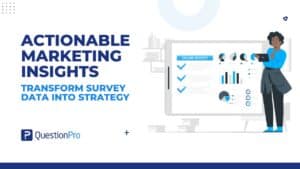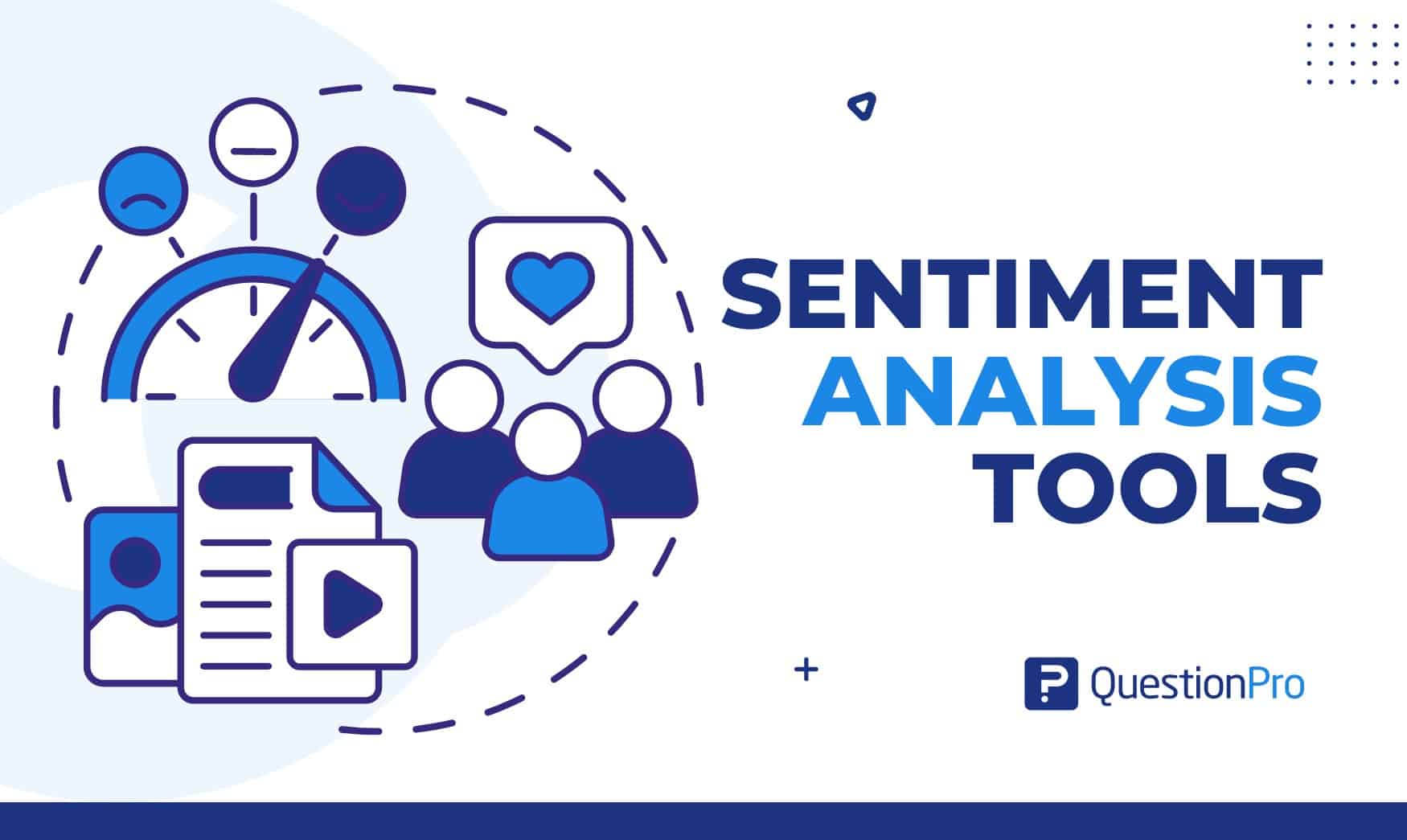
Understanding how people feel about your brand is crucial in a world where every like, comment, and review matters. Imagine having the power to peek into your customers’ hearts and minds to see what makes them tick. That’s where sentiment analysis tools come in.
Most sentiment analysis tools help businesses understand the emotions expressed in text data, such as customer reviews, social media posts, and surveys. However, with so many tools available, it can be overwhelming to figure out which ones are best for understanding emotions effectively. That’s where our guide comes in!
In this blog, we will explore the top 15 sentiment analysis tools that are user-friendly, powerful, and perfect for businesses of all sizes. So, buckle up and get ready to dive into the exciting world of sentiment analysis!
What are Sentiment Analysis Tools?
Sentiment analysis tools are software applications or algorithms designed to analyze and interpret text data’s sentiment or emotional tone. They use natural language processing (NLP) techniques to understand the underlying emotions, attitudes, opinions, and intentions conveyed in written text, such as social media posts, customer reviews, survey responses, and news articles.
These tools classify text into positive, negative, or neutral categories, or they may assign a sentiment score indicating the intensity or polarity of the sentiment. By automating the sentiment analysis process, these tools enable businesses and organizations to gain valuable customer insights into customer feedback, public opinion, market trends, and brand reputation.
Sentiment analysis tools are used across various industries for purposes such as:
- Social Media Monitoring: Tracking and analyzing brand mentions, customer feedback, and trends on various social media platforms.
- Customer Experience Management: Understanding consumer satisfaction, identifying issues, and improving products or services based on feedback.
- Market Research: Gauging public opinion, identifying consumer preferences, and predicting market trends.
- Brand Monitoring: Monitoring brand sentiment, reputation management, and crisis response.
- Political Analysis: Analyzing public sentiment towards political candidates, parties, and policies.
- Financial Trading: News articles and social media sentiment analysis to inform investment decisions.
Sentiment analysis tools are crucial in helping businesses and organizations make data-driven decisions, enhance customer satisfaction, and stay ahead of the competition in today’s data-driven world.
Benefits of Adopting a Sentiment Analysis Tool
A sentiment analysis tool can offer numerous benefits across various fields, including marketing, customer service, product development, and brand management. Here are some key benefits:
Understanding Customer Sentiment
By analyzing customer feedback, reviews, and social media mentions, sentiment analysis tools help you understand how customers feel about your products, services, and brand. This insight allows you to identify areas for improvement, address customer concerns, and enhance overall customer satisfaction.
Reputation Management
Sentiment analysis software enables you to monitor online conversations and news articles related to your brand. You can protect your reputation and mitigate potential PR crises by identifying and addressing negative sentiment in real-time.
Market Research and Competitor Analysis
Sentiment analysis provides valuable insights into market trends, consumer preferences, and competitor strategies. You can identify emerging trends, market opportunities, and competitive threats by analyzing sentiment across different demographics and geographical regions.
Product Development and Innovation
Sentiment analysis helps you gather feedback on existing products and services and identify unmet customer needs and preferences. This information can guide your product development efforts, prioritize feature enhancements, and drive innovation.
Marketing and Advertising
Sentiment analysis informs your marketing and advertising strategies by identifying the most effective messaging, channels, and campaigns. By understanding the sentiment of your target audiences, you can create more relevant and engaging content, optimize ad spend, and improve campaign performance.
Customer Service Optimization
A sentiment analyzer can analyze customer support interactions, such as emails, chats, and call transcripts, to gauge customer satisfaction and identify recurring issues. This insight allows you to optimize customer service processes, train support agents, and proactively address customer concerns.
Brand Monitoring and Crisis Management
Sentiment analysis software lets you monitor mentions of your brand, products, and key stakeholders across various online platforms. You can proactively address issues and prevent potential crises by detecting signs of dissatisfaction or negative sentiment early on.
Data-Driven Decision Making
Sentiment analysis provides actionable insights based on data-driven customer sentiment analysis and market trends. By incorporating sentiment analysis into your decision-making processes, you can make more informed strategic decisions and allocate resources effectively.
Top 15 Sentiment Analysis Tools for Understanding Emotions
Sentiment analysis software helps businesses understand the emotions and opinions expressed in text data such as customer reviews and surveys. Here are 15 best sentiment analysis tools that can help businesses understand customer emotions:
1. QuestionPro
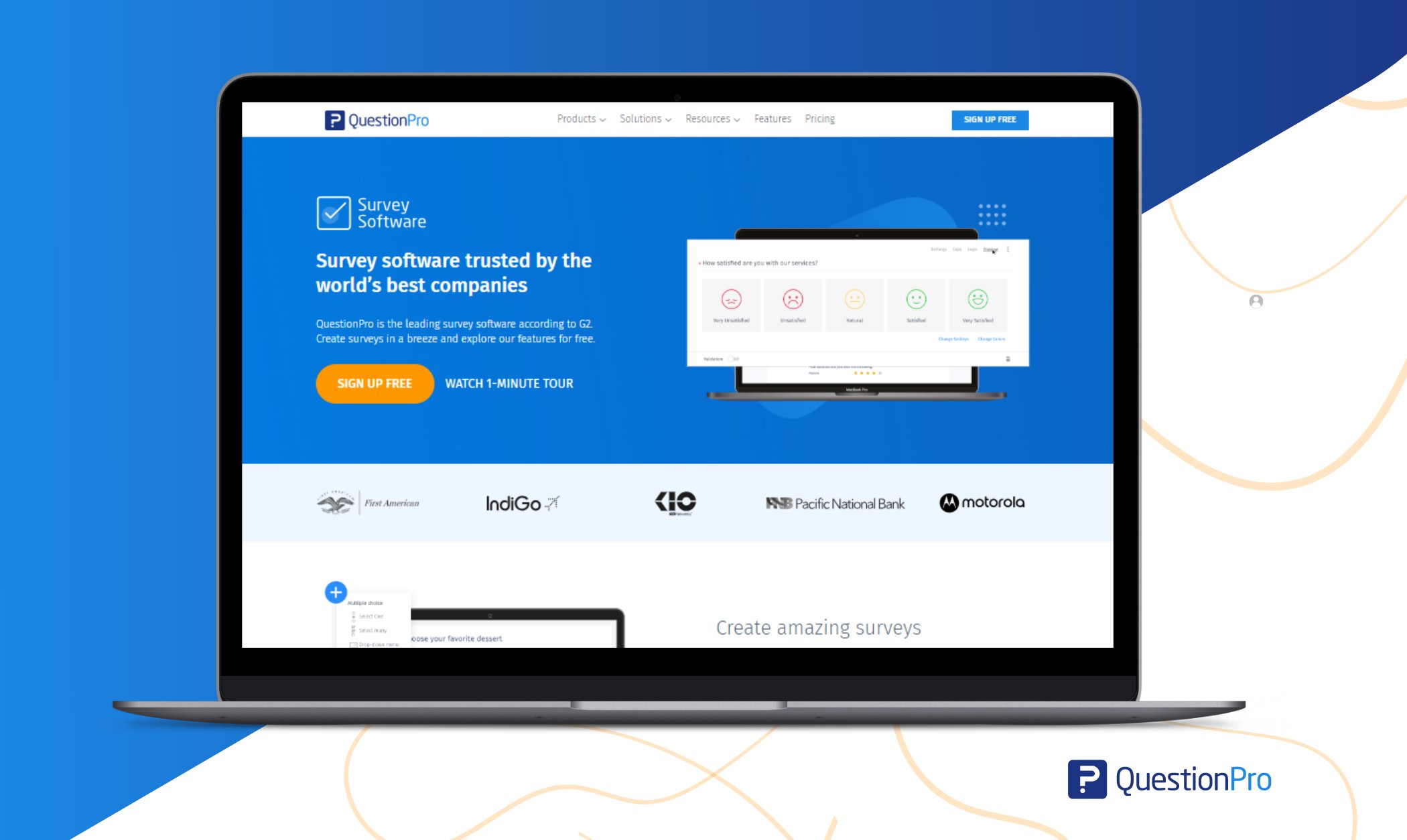
QuestionPro offers robust sentiment analysis capabilities, making it a business go-to choice. Its advanced natural language processing (NLP) algorithms ensure accurate categorization of sentiments. Plus, it’s versatile enough to integrate with other platforms you might already be using.
Key Features:
- Advanced Sentiment Analysis Algorithms.
- Customizable Surveys and Feedback Forms.
- Text Analysis Tool.
- Real-time Monitoring and Reporting.
- Integration with Third-party Platforms.
- Multi-channel Data Collection.
Pros:
- QuestionPro offers comprehensive analytics features.
- Actionable insights derived from sentiment analysis.
- Scalable solutions were suitable for businesses of all sizes.
Cons:
- Some advanced features may require technical expertise.
Pricing:
- Offers pricing plans starting from $99 per month.
2. Brand24
Brand24 specializes in social media monitoring and sentiment analysis. It’s great for tracking mentions of your brand, products, and even your competitors across online platforms. Its real-time alerts and competitive sentiment analysis tools make it a valuable asset for brand management.
Key Features:
- Social Media Monitoring.
- Advanced Sentiment Analysis.
- Real-time Alerts.
- Competitive Analysis.
Pros:
- Social Media Tracking.
- Integration with third-party platforms enhances functionality.
- Dedicated customer support for assistance and guidance.
Cons:
- Limited integration options may restrict data sharing.
- Higher pricing for advanced features may not suit all budgets.
Pricing:
- Brand24 offers pricing plans starting from $79 per month per person.
3. MonkeyLearn
MonkeyLearn is a text analysis platform offering powerful sentiment analysis features. It’s user-friendly and allows businesses to examine customer feedback, social media channels, and more. The best part? It offers customizable models, so you can tailor it to your specific needs.
Key Features:
- Text Analysis Tools.
- Advanced Sentiment Analysis Algorithms.
- Customizable Models.
- Integration with Business Applications.
- Scalable Pricing Options.
Pros:
- Comprehensive analytics and reporting tools.
- Actionable insights derived from sentiment analysis.
- Dedicated customer support for assistance and guidance.
Cons:
- Some advanced features may require technical expertise for implementation.
- Limited integration options may restrict functionality.
- Some users may prefer more customization options.
Pricing:
- Pricing varies based on features and usage. Contact MonkeyLearn for specific pricing details.
4. Social Mention
Social Mention stands out for its simplicity and affordability. It’s a free social media monitoring tool with basic sentiment analysis capabilities. While it might not offer advanced features, it’s a great starting point for businesses dipping their toes into sentiment analysis.
Key Features:
- Real-time Social Media Monitoring.
- Basic Sentiment Analysis.
- Simple and Intuitive Interface.
- Easy Sharing and Exporting of Data.
- Offers Free Sentiment Analysis Tools
Pros:
- Customizable reporting options for actionable insights.
- Integration with third-party platforms enhances functionality.
- Scalable solutions are suitable for businesses of all sizes.
Cons:
- Limited customization options may restrict advanced analysis.
- Basic sentiment analysis may lack depth for comprehensive insights.
Pricing:
- Social Mention is a free sentiment analysis tool.
5. AskNicely
AskNicely focuses on customer feedback and sentiment analysis, particularly through Net Promoter Score (NPS) surveys. It’s easy to use and offers real-time reporting, making it ideal for businesses looking to improve customer satisfaction and loyalty.
Key Features:
- Real-time Feedback Collection and Analysis.
- Integration with CRM and Helpdesk Systems.
- Actionable Insights and Recommendations.
- User-friendly Feedback Collection Tools.
- Customizable Surveys.
Pros:
- Scalable solutions are suitable for businesses of all sizes.
- Affordable pricing plans for varying budgets.
- Easy integration with third-party platforms enhances functionality.
Cons:
- Limited scalability may not suit larger enterprises.
- Higher pricing compared to some competitors.
Pricing:
- Pricing varies based on features and usage. Contact AskNicely for specific pricing details.
6. Qualaroo
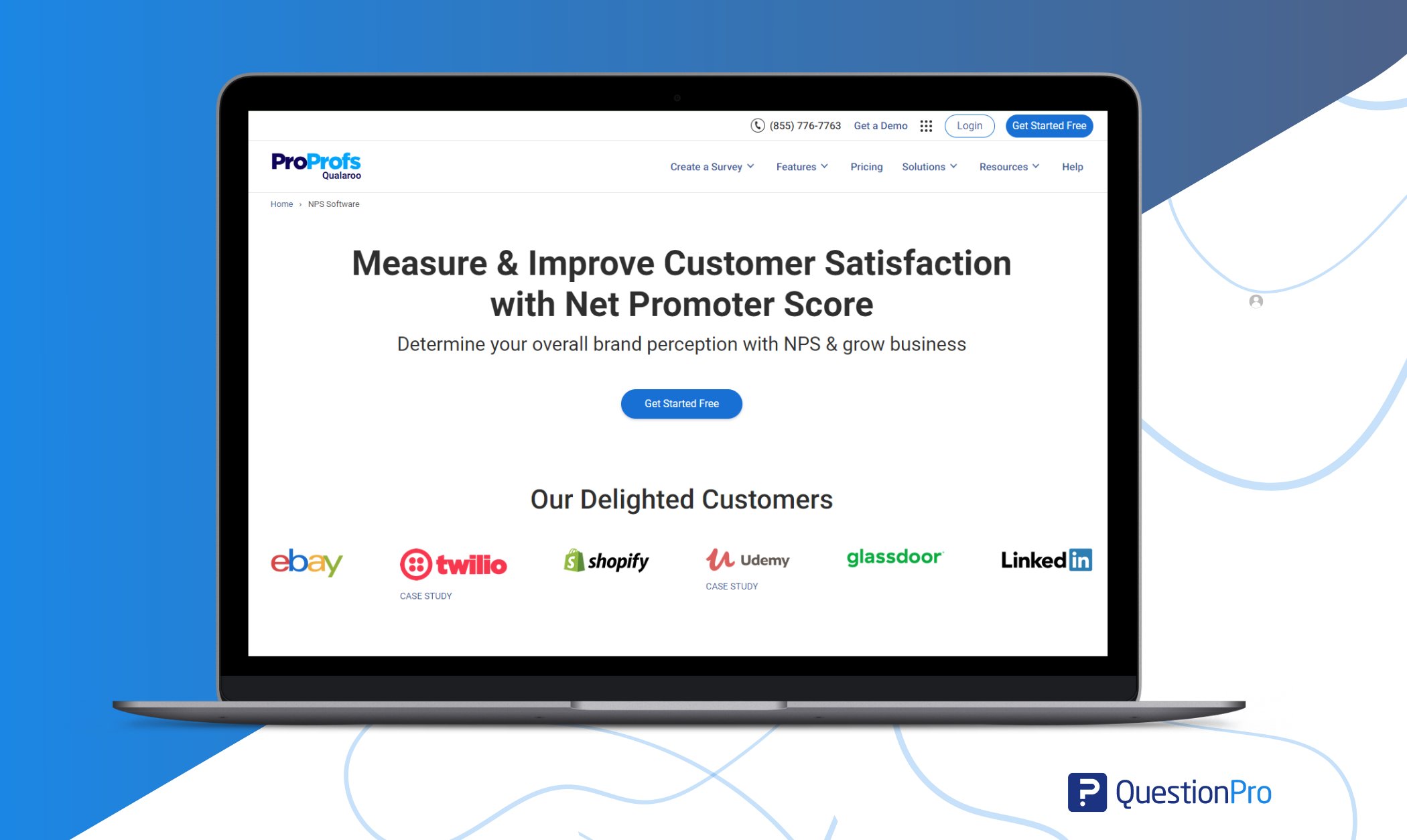
Qualaroo specializes in user feedback and sentiment analysis, offering customizable survey templates and advanced sentiment analysis algorithms. While its interface may require some training to navigate, its actionable insights make it a valuable asset for businesses.
Key Features:
- User-friendly Feedback Collection Tools.
- Advanced Sentiment Analysis Algorithms.
- Customizable Survey Templates.
- Integration with CRM and Analytics Platforms.
- Actionable Insights and Recommendations.
Pros:
- Customizable surveys to specific business objectives.
- Effective Question Engine.
- Reduce the feedback analysis time with its inbuilt AI-based analytical tool.
Cons:
- A bulk action button is needed to export reports from multiple surveys at once.
- There is no feature to embed surveys directly into the mail body.
Pricing:
- Pricing varies based on features and usage. Contact Qualaroo for specific pricing details.
7. Meltwater
Meltwater is a leading provider of comprehensive media intelligence solutions, catering to businesses seeking to effectively understand and leverage media mentions, sentiments, and trends. With robust tools and advanced algorithms, Meltwater empowers businesses to monitor, analyze, and derive actionable insights from media coverage across various channels.
Key Features:
- Robust Media Monitoring.
- Advanced Sentiment Analysis.
- Real-time Alerts.
- Competitive Analysis.
Pros:
- Robust data sources.
- Nice visual representations of mentions/conversations.
- User-friendly interface for easy navigation and usage.
Cons:
- Sales reps may not be responsive.
Pricing:
- Pricing is available upon request and may vary based on the business’s specific requirements.
8. Podium
Podium is a customer interaction platform that offers sentiment analysis features to help businesses understand and manage customer feedback effectively. With its suite of tools, businesses can collect and analyze customer feedback, reviews, messages, and feedback from various channels to gain insights into customer emotions.
Key Features:
- Review Management.
- Sentiment Analysis.
- Real-time Feedback.
- Multi-channel Communication.
- Customizable Reporting.
Pros:
- Quick access to incoming website inquiries.
- User-friendly interface for easy navigation.
- Customizable reporting tools for actionable insights.
Cons:
- Has loading problems sometimes.
Pricing:
- Pricing is available upon request and may vary based on the business’s specific needs.
9. AskNicely
AskNicely is a customer feedback platform specializing in Net Promoter Score (NPS) surveys and sentiment analysis. It helps businesses collect, analyze, and act on customer feedback to improve customer satisfaction and loyalty.
Key Features:
- NPS Surveys.
- Sentiment Analysis.
- Real-time Reporting.
- Actionable Insights.
Pros:
- Specialized in sentiment analysis.
- Integration with CRM systems for data synchronization.
- The system is very easy to use and intuitive.
Cons:
- Advanced features may require additional setup and configuration.
Pricing:
- Pricing is available upon request.
10. Awario
Awario is a social media monitoring app with a sentiment analysis feature designed to track brand mentions and sentiment across online platforms. Its advanced sentiment analysis capabilities make it a great choice for businesses looking to manage their online reputation effectively.
Key Features:
- Social Media Monitoring.
- Advanced Sentiment Analysis.
- Competitive Analysis.
- Reporting and Analytics.
Pros:
- Real-time alerts for proactive engagement.
- Competitive analysis tools for benchmarking.
- Robust reporting and analytics features.
Cons:
- Pricing may be higher compared to some competitors.
Pricing:
- Pricing starts at $89 per month for the pro plan.
11. Medallia

Medallia rounds up our list with its comprehensive customer experience management platform, including sentiment analysis features. While pricing may be on the higher side, its robust text analytics and actionable insights make it a top choice for businesses prioritizing customer satisfaction.
Key Features:
- Customer Feedback Collection.
- Advanced Sentiment Analysis.
- Text Analytics and Insights.
- Action Planning and Follow-up.
Pros:
- Allows clients to quickly and easily rate your business.
- Real-time monitoring and alerts for proactive engagement.
- Scalable solutions are suitable for businesses of all sizes.
Cons:
- The implementation and onboarding process may require time and resources.
Pricing:
- Pricing is available upon request.
12. SentiSum
SentiSum is an AI-driven text analytics platform specializing in sentiment analysis and text classification. It helps businesses extract valuable insights from unstructured text data, enabling them to effectively understand customer emotions.
Key Features:
- Advanced Sentiment Analysis Algorithms.
- Customizable Text Classification.
- Real-time Insights.
- Actionable Recommendations.
Pros:
- Accurate sentiment analysis results.
- Seamless integration with multiple data sources.
- Natural language processing (NLP) algorithms.
Cons:
- Limited documentation or support resources for complex use cases.
Pricing:
- Pricing is available upon request and may vary based on specific requirements.
13. Lexalytics
Lexalytics provides powerful text analytics and sentiment analysis capabilities, designed to help businesses understand customer feedback and market trends. It offers advanced natural language processing and machine learning algorithms to deliver precise insights.
Key Features:
- Advanced Text Analytics.
- Sentiment Analysis with Contextual Understanding.
- Customizable Models and Dashboards.
- Integration with CRM and Business Intelligence Platforms.
Pros:
- High accuracy in sentiment classification.
- Customizable for industry-specific needs.
- Strong data visualization and reporting tools.
Cons:
- It can be complex to set up and customize.
- Higher cost compared to some alternatives.
Pricing:
- Pricing is available upon request.
14. Survicate
Survicate is a customer feedback tool that incorporates sentiment analysis to provide insights into user experiences. It integrates seamlessly with other platforms and offers easy-to-use survey and feedback collection tools.
Key Features:
- Sentiment Analysis.
- Customer Feedback Surveys.
- Integration with CRM and Marketing Platforms.
- Real-time Reporting and Insights.
Pros:
- Easy to set up and use.
- Good integration options with other tools.
- Offers a range of survey types and feedback collection methods.
Cons:
- Limited advanced analytics features.
- Basic sentiment analysis compared to some competitors.
Pricing:
- Pricing plans for business start from $99 per month.
15. Talkwalker
Talkwalker offers a comprehensive suite of social listening and sentiment analysis tools. It’s known for its powerful analytics capabilities and ability to track brand sentiment across a wide range of media channels.
Key Features:
- Social Media Monitoring.
- Advanced Sentiment Analysis.
- Image Recognition and Analysis.
- Competitive Benchmarking.
Pros:
- Extensive coverage of media channels.
- Powerful analytics and reporting tools.
- Effective brand reputation management.
Cons:
- It can be expensive for smaller businesses.
- The platform may have a steep learning curve.
Pricing:
- Pricing is available upon request and varies based on business needs.
Wondering how to understand your customers better? Dive into QuestionPro’s latest blog about their Customer Insight Platform!
Utilize QuestionPro as Your Sentiment Analysis Tool
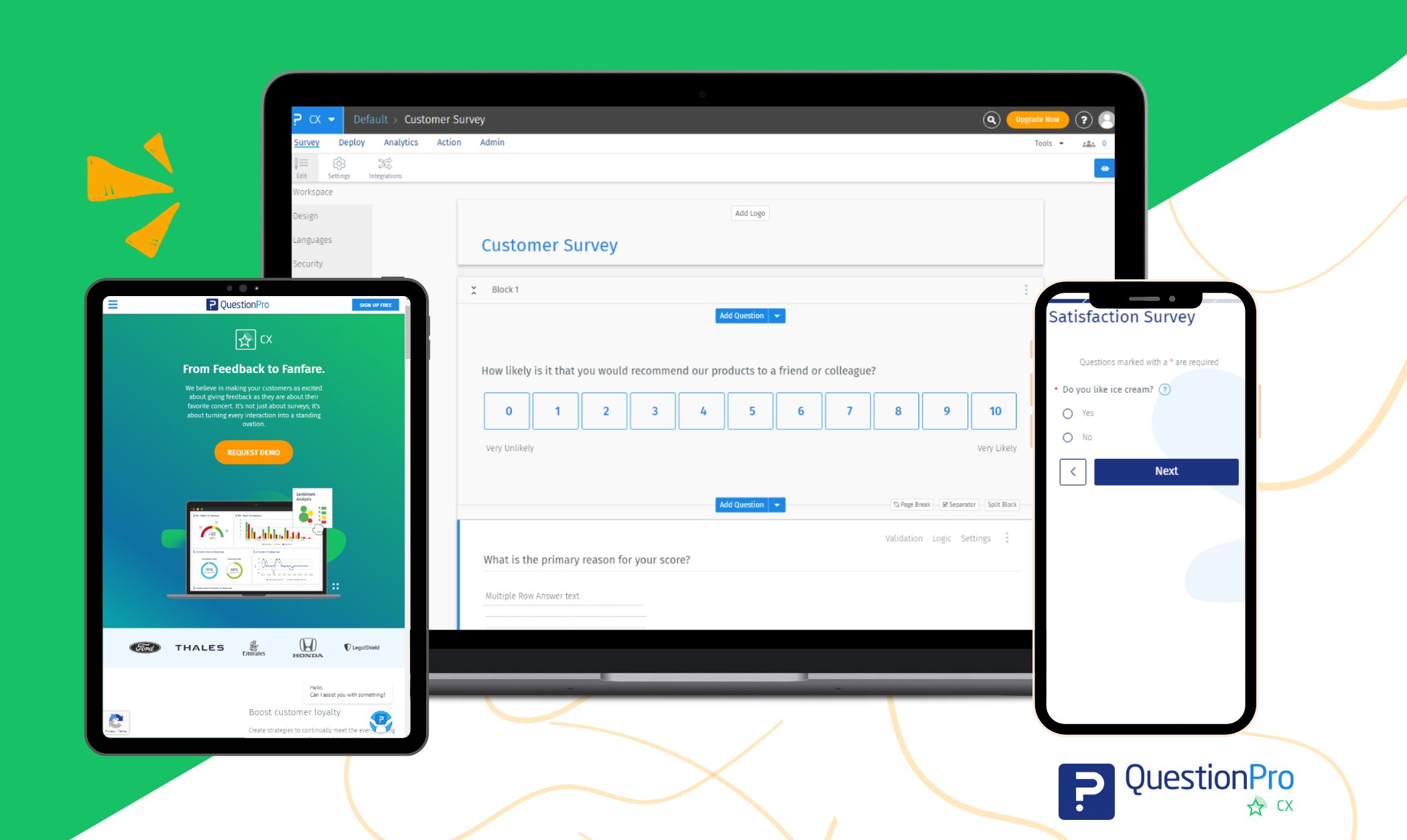
QuestionPro offers robust sentiment analysis capabilities, making it an ideal choice for analyzing survey responses. By leveraging NLP and rule-based text analysis algorithms, QuestionPro processes textual survey responses to extract sentiments and visualize them in intuitive charts, such as bubble graphs. Here’s why QuestionPro stands out as the top choice:
Advanced Natural Language Processing (NLP) Algorithms
QuestionPro harnesses cutting-edge NLP algorithms to accurately categorize customer sentiments as positive, negative, or neutral. This ensures precise sentiment analysis across diverse data sources, enabling businesses to extract meaningful insights from customer feedback.
Seamless Integration and User-Friendly Interface
With QuestionPro’s intuitive platform, users can easily access sentiment analysis features within the familiar environment of their survey and feedback management tools. The seamless integration with existing CRM systems and marketing platforms enhances functionality and streamlines data collection and analysis processes.
Real-time Monitoring and Reporting
QuestionPro empowers businesses with real-time monitoring and reporting capabilities, allowing them to track evolving customer sentiments as they happen. The platform’s interactive dashboards provide instant access to actionable insights, facilitating timely decision-making and responsive customer engagement.
Customizable Solutions for Diverse Business Needs
Whether you’re a small startup or a large enterprise, QuestionPro offers customizable survey and feedback form templates tailored to meet specific business objectives. This flexibility ensures businesses can effectively adapt their data collection efforts to target audience segments, driving enhanced customer satisfaction and loyalty.
Scalable Pricing and Cost-Effectiveness
QuestionPro’s scalable pricing options accommodate businesses of all sizes, from startups to Fortune 500 companies. With transparent credit-based billing and no additional charges for generating multiple reports from the same response set, QuestionPro offers cost-effective solutions for sentiment analysis needs.
Actionable Insights and Reporting
In addition to sentiment analysis, QuestionPro provides actionable insights and recommendations based on customer feedback. Users can easily export tagged data and sentiment analysis reports in Excel, facilitating further analysis and sharing with stakeholders.
Support for Multilingual Sentiment Analysis
While many sentiment analysis tools are limited to English-language data, QuestionPro supports multiple languages, allowing businesses to analyze sentiment in diverse markets and regions.
Conclusion
These top 15 sentiment analysis tools are helpful for businesses of all sizes and industries. By leveraging these tools, businesses can gain valuable insights into customer emotions, improve their products and services, and ultimately enhance customer satisfaction.
QuestionPro is best for sentiment analysis due to its advanced technology, comprehensive data collection capabilities, real-time monitoring, customization options, seamless integration, actionable insights, and scalability.
With QuestionPro, businesses can unlock the true power of customer feedback and drive success in today’s competitive market landscape. Contact QuestionPro today for a free trial or learn more.
Frequently Asked Questions (FAQs)
A sentiment analysis tool is software designed to assess and classify the emotional tone of a text. It evaluates whether the sentiment expressed is positive, negative, or neutral. These tools use algorithms and natural language processing techniques to analyze user reviews, social media posts, feedback, and other textual data.
The best way to conduct sentiment analysis depends on your specific needs and the nature of the text data. Generally, using a combination of machine learning models and natural language processing techniques yields the best results.
The three primary types of sentiment analysis are:
i) Document-Level Sentiment Analysis
ii) Sentence-Level Sentiment Analysis
iii) Aspect-Based Sentiment Analysis
Sentiment analysis using AI tools involves leveraging artificial intelligence, particularly machine learning and deep learning algorithms, to evaluate the sentiment expressed in text data. AI tools use advanced natural language processing (NLP) techniques to understand context, detect nuances, and provide more accurate sentiment assessments. These tools can analyze large volumes of text efficiently and adapt to various languages and styles, improving the precision and scalability of sentiment analysis tasks.
Yes, many sentiment analysis tools offer APIs or built-in integrations with other software, such as CRM systems, social media platforms, and analytics tools. This allows for seamless data flow and enhanced functionality within existing workflows.






